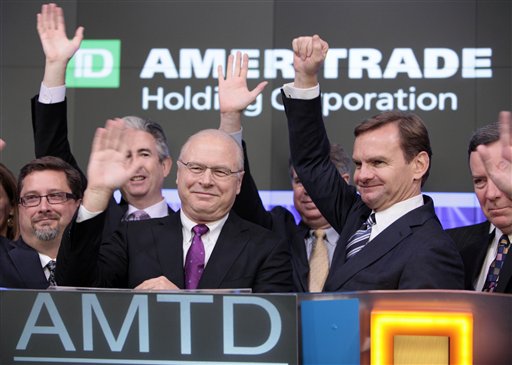Tomczyk says discount brokerage still has no plan to buy E*Trade; the company could authorize a dividend at some point, however.
TD Ameritrade Holding Corp., the discount-brokerage firm with a burgeoning asset-gathering channel through independent advisers, still believes that rival E*Trade Financial Corp. is too burdened with problems to be considered an acqusition candidate.
“I don't think there's anything that can be done at the current time,” TD Ameritrade chief executive Fred Tomczyk said at the company's annual meeting today when asked about buying E*Trade. “There's too many issues ... There's too much risk for us.”
Mr. Tomczyk, who has stated that E*Trade's banking and mortgage problems loom large, said that the U.S. economy as a whole remains difficult and that rock-bottom interest rates continue to weigh on revenues.
“We are still in a difficult and challenging environment, and we don't expect that to end anytime soon,” he said, noting that fee waivers on money market funds and reduced interest-related revenue challenged the company's bottom line last year and into this year's first fiscal quarter. The trend is likely to continue throught the year, he added, given signals from the Federal Reserve Board and its chairman.
“We don't see interest rates changing through 2010,” he said. “Mr. Bernanke is keeping them low and will keep them low in the forseeable future,” pending rising rates of employment and other factors.
Mr. Tomczyk also said that markets remain uncertain, but he expressed confidence about TD Ameritrade's position versus its rivals'.
Recent decisions by The Charles Schwab Corp. and Fidelity Investments to lower online stock trade commissions to $8.95 and $7.95, respectively, without regard to share price or trade quotas, brings them in line with the flat pricing TD Ameritrade has long offered, he said. The discount brokerage has no immediate plans to lower its $9.99 commission but will closely monitor statistics to ensure it remains the largest online broker for active traders.
“We recognize that our competition has upped their game and are coming back at us,” he said. “It is a competitive environment.”
But Mr. Tomczyk boasted that his firm's balance sheet remains strong, with more than $1 billion in cash to deploy for acquisitions, stock buybacks and, potentially, a dividend. He also took some shots at his rivals, without naming them, by saying that TD Ameritrade has a unique multichannel model for serving investors online directly, or by phone or through independent advisers, “without a bias” toward any particular channel.
Competitors “tend to anchor all their client realtionsips to one model,” he said, “and they can get stuck in that model.” TD Ameritrade, he insisted, offers incentives to employees in every channel to make referrals where appropriate, and requires every one of its service reps also to assume sales responsibilities.
TD Ameritrade's relationship with Canada's TD Bank Financial Group, which owns almost 45% of the online broker, also helps its balance sheet, he said. By moving about $20 billion from money market funds to interest-bearing deposit accounts at the bank last year, TD earned about 180 basis points on the balances versus virtually nothing on the money market accounts. Without naming Schwab, which this year raised capital to support its subsidiary bank's ability to take on new deposits, Mr. Tomczyk said: “Some of our peers are trying to folow our strategy” regarding sweeps into bank accounts. “They had to raise capital and dilute shareholders” to do it.
Asked if TD Ameritrade will consider paying a dividend to shareholders, he said he is aware that some investors won't consider holding a non-dividend-paying stock. “At some point, given the cash we're generating ... a dividend absolutely makes sense for TD Ameritrade.”
For the time being, however, he said the firm will “keep its powder dry” to have funds available for organic growth, including technology improvement, and acquisitions.
Shares of TD Ameritrade, which has traded in a range of $10.09 to $21.30 over the past 52 weeks, changed hands recently down nine cents, or 0.52%, at $17.36.







